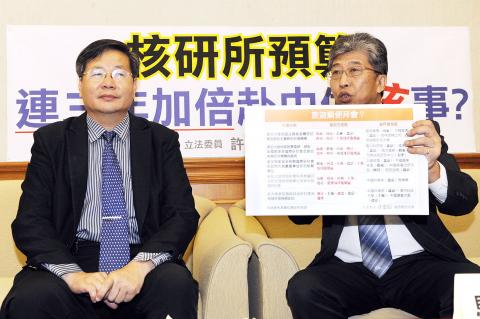|
INER wasting public
funds: lawmaker
PRIVATE SIGHTSEEING? Hsu Chung-hsin questioned
the nuclear research institute¡¦s focus on China, instead of countries that have
advanced nuclear technology
By Chris Wang and Lee I-chia / Staff reporters

Institute of Nuclear Energy
Research director-general Ma Yin-pang, right, responds to questions from Taiwan
Solidarity Union Legislator Hsu Chung-hsin about a sevenfold increase in the
institute¡¦s budget for China visits since 2010, during a press conference in
Taipei yesterday.
Photo: Chen Chih-chu, Taipei Times
A Taiwan Solidarity Union (TSU) lawmaker
yesterday accused the Institute of Nuclear Energy Research¡¦s (INER) of
squandering public funds, questioning the sharp increase in budget allocated for
inspection trips to China over the past five years.
The annual budget for China visits allocated by the institute under the Atomic
Energy Council (AEC) has increased about sevenfold since 2010 ¡X from NT$440,000
(US$14,900) in 2010 to NT$2.75 million for next year, TSU Legislator Hsu Chung-hsin
(³\©¾«H) told a news conference.
The destinations for the institute¡¦s visiting programs covered more than a dozen
Chinese provinces, Hsu said.
In comparison, the annual budget for visiting programs to Western countries has
been consistent ¡X between NT$1.91 million and NT$2.41 million ¡X over the past
five years, showing no significant increase.
Hsu questioned the necessity for the visits to China, saying that Taiwan could
neither profit from technology transfers nor learn from Chinese development of
nuclear technology.
¡§What the INER should have done was ... more visits to Western countries to
inspect their advanced nuclear technology or their efforts to abandon nuclear
power,¡¨ Hsu said.
Hsu said that following the disaster at Japan¡¦s Fukushima Dai-ichi nuclear power
plant, Germany has decided to gradually phase out nuclear power by 2022. It
would have been understandable then if the INER had allocated more budget to
visit Germany to study its advanced technology, instead of focusing on China.
¡§Has there been any great improvement in China¡¦s nuclear technology in recent
years? Or are INER [staff] actually touring China under the guise of visiting to
search for cooperation opportunities?¡¨ he asked.
Citing five of the institute¡¦s China visit projects as examples, Hsu said the
destinations for each project included many provinces that did not have any
research facilities or related companies, and some provinces were located far
from the facilities they visited.
¡§Is the institute using these projects as travel incentives for officials?¡¨ Hsu
asked.
He added that the number of staff visiting China had also increased from six in
2010 to 23 last year, with 30 planned for this year and for next year.
In response, INER director-general Ma Yin-pang (°¨®ï¨¹) said that the nuclear
energy program only accounted for one-third of the institute¡¦s annual budget,
with renewable energy development and technology the focus in recent years.
¡§And China has been one of the fastest-growing markets in terms of renewable
energy,¡¨ Ma said.
Ma denied that the visits had been arranged to provide private sightseeing tours
for institute staff.
He added that the annual budget proposal was submitted about one year
beforehand, when the actual visiting destinations had yet to be confirmed, so
the institute had to list more possible destinations to avoid having to modify
the proposal afterward.
¡§If any of the officials spent the institute¡¦s money on touring other
destinations unrelated to their job, I will make sure they face administrative
punishments,¡¨ he said.
|
![]()
![]()
![]()